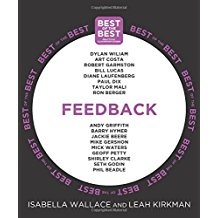Feedback from Crown House Publishing

In Feedback, Isabella Wallace, Leah Kirkman and their contributors explore the real meaning of what is often cited as one of the most powerful tools for enhancing learning ...
According to Isabella Wallace and Leah Kirkman, when it comes to feedback the trick is to ‘get the balance right between praise and constructive critique by keeping feedback specific, detailed and firmly referenced to clearly explained criteria’.
Feedback is arguably one of the most powerful tools available to teachers for enhancing learning. And in the classroom it can be understood and implemented in a whole range of ways, as Isabella, Leah and their contributors – the best of the best – demonstrate.
Mike Gershon, for example, demonstrates that feedback is not a one off response but must be viewed as a continuing process or dialogue. As part of that continued dialogue, Mick Waters explores the idea of feedback from students to teachers – a reversal of our usual assumptions about the direction of flow.
Other contributors give us a different perspective, focusing instead on what constitutes the most useful and effective feedback. For example, Art Costa and Robert Garmston challenge the notion that feedback should be about giving praise. Barry Hymer also argues that simple praise and reward only serve to keep the teacher in control, thereby robbing the student of self-efficacy.
Seth Godin takes this a step further and suggests that for feedback to have any real meaning it should offer an analysis rather than simply an opinion. The argument for analytical and specific feedback is then picked up by Ron Berger and Diana Laufenberg, who both advocate the importance of giving feedback referenced to clear criteria. Their practical approaches to this do differ somewhat, however.
There are too many contributors to name individually, but throughout Feedback Isabella and Leah have brought together some of the biggest names in education to explore this wide-reaching subject. From these contributions, each unique and enlightening in its own right, a number of key themes emerge. Their opinions may differ but, above all, these contributors are all united in the view that what effective feedback is primarily about is clear, constructive and specific communication.
Suitable for all educationalists, including teachers and school leaders.
With contributions from: Dylan Wiliam, Art Costa, Robert Garmston, Bill Lucas, Diana Laufenberg, Paul Dix, Taylor Mali, Ron Berger, Andy Griffith, Barry Hymer, Jackie Beere, Mike Gershon, Mick Waters, Geoff Petty, Shirley Clarke, Seth Godin and Phil Beadle.
More at: www.londonbookfair.co.uk



|